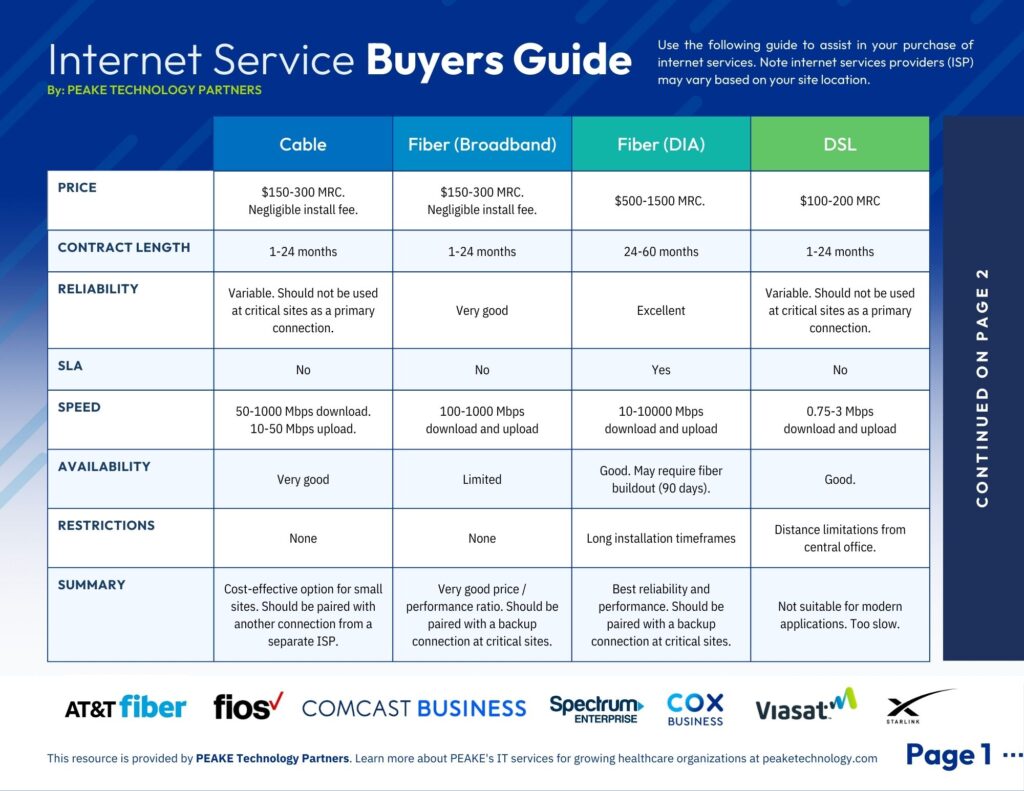As a medical practice, it is essential to have reliable and fast internet service to support the needs of your patients and staff. With so many options available, it can be challenging to determine the best solution for your practice. In this article, we'll explore the various types of internet service available and consider the factors you should take into account when making a decision.
Download PEAKE’s Internet Service Buyers Guide and view the comparison chart:

Cable Broadband
Cable broadband is a popular option for many businesses because it is widely available and tends to offer fast speeds. It is delivered via a coaxial cable, which is the same type of cable used for cable TV. One of the main benefits of cable broadband is that it is generally very reliable, as the connection is not susceptible to weather-related disruptions.
Fiber Broadband
Fiber broadband is another high-speed option that uses fiber optic cables to transmit data. It is considered one of the fastest and most reliable internet options available. The main advantage of fiber broadband is that it can support a wide range of bandwidth-intensive activities, such as streaming high-definition video or conducting videoconferences.
Fiber DIA (Dedicated Internet Access)
Fiber DIA is a type of internet service that is dedicated to a single customer. It is essentially a private network that is not shared with other users. This means that you can expect a consistent and reliable connection with no interference from other users. Fiber DIA is a good option for practices that require a high level of security or a large amount of bandwidth.
DSL (Digital Subscriber Line)
DSL is a type of broadband internet that uses traditional copper telephone lines to transmit data. It is generally slower than other types of broadband, but it is widely available and can be a good option for practices in areas where other types of internet service are not available.
4G/5G Cellular
For practices in rural or underserved areas, cellular internet service may be the only option available. Both 4G and 5G cellular networks offer high-speed internet access, but 5G is generally faster and more reliable. The main drawback of cellular internet is that it is dependent on the availability of a cellular signal, which can be spotty in some areas.
Geosync Satellite
Geosync satellite internet is delivered via a satellite that is positioned in a fixed orbit above the earth. It is a good option for practices in rural or remote areas where other types of internet service are not available. However, it can be slower and less reliable than other types of internet service due to the distance the signal must travel.
LEO Satellite
LEO (low earth orbit) satellite internet is delivered via a network of satellites that orbit the earth at a lower altitude than geosync satellites. This means that the signal has a shorter distance to travel, which can result in faster and more reliable service. However, LEO satellite internet is a relatively new technology, and it may not be available in all areas.
When choosing an internet service for your medical practice, there are several factors to consider:
- Speed: The speed of your internet connection is important for activities such as streaming video or conducting videoconferences. Consider how much bandwidth you will need to support the needs of your practice.
- Reliability: A reliable internet connection is essential for a medical practice. Look for providers with a track record of uptime and consider options such as fiber broadband or fiber DIA, which are generally more reliable than other types of internet service.
- Cost: The cost of internet service can vary widely depending on the provider and the type of service you choose. Consider your budget and compare costs from multiple providers to find the best value.
As a medical practice, it is essential to have reliable and fast internet service to support the needs of your patients and staff. With so many options available, it can be challenging to determine the best solution for your practice. In this article, we'll explore the various types of internet service available and consider the factors you should take into account when making a decision.
Download PEAKE’s Internet Service Buyers Guide and view the comparison chart:
Talk to a PEAKE Practice Advisor
Call 866.357.3253 or schedule a free consultation at your convenience.
View Scheduling Options